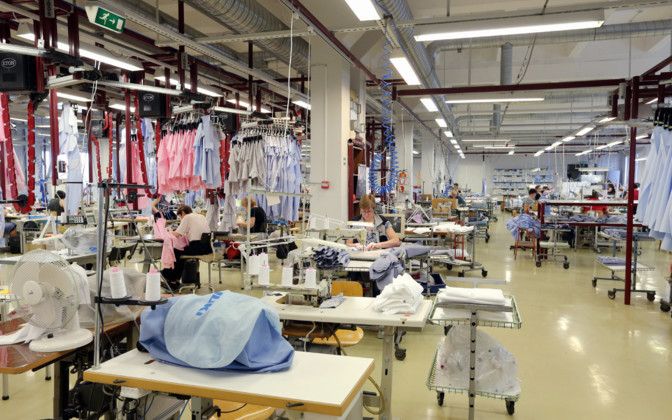Tekstiilitööstus

Tekstiilitööstus Eestis ei ole parimas positsioonis: seda iseloomustavad suured tootmiskulud, sealhulgas tööjõukulud, samuti madal müük.
Rõivakontsern Baltika sulgeb Eestis tootmise, koondab 340 töötajat ning kaotab Mosaici ja Bastioni brändid. Ettevõte keskendub rahvusvahelise kasvu asemel edaspidi müügile Balti riikides. Strateegilise pöörde rahastamiseks loodetakse aktsionäridelt kaasata viis miljonit eurot.
Eesti tekstiilitööstuse lipulaev alustas 1928. aastal vihmakuubede vabrikuna. 1980. sai Baltikast üks esimesi erastatud riigiettevõtteid Eestis, vahendas "Aktuaalne kaamera".
Käesoleval sajandil on Baltika missioon viia oma moebrändid laia maailma koos sõnumiga Eestist kui elujõulisest disainimaast, seisab ettevõtte veebilehel.
Paraku ei ole missiooni elluviimise ärimudel kestlik, tõdes Baltika juht Meelis Milder.
"Meie tänase ärimudeli põhiprobleem on see, et oleme kogu aeg tahtnud rahvusvaheliselt kasvada. Täna valime teise tee. Selle tee nimi on koondumine," märkis ta.
Baltika lõpetab Eestis tootmise, koondab tehastes üle 340 inimese ja sulgeb Mosaici ja Bastioni brändid, aga jätab tööle kõik disainerid. Plaan on vähendada tegevuskulusid kahe miljoni euro võrra aastas.
"Täna on minu jaoks päris kurb päev. Pärast 60 aastast oma tootmise omamist pidin täna minema meie tehase tööliste ette ja rääkima sellest perspektiivist. Meil on kuus kuud ette valmistada uusi hankekohti. Need saavad olema tõenäoliselt Euroopas, ilmselt Lõuna-Euroopas või Türgis," selgitas juhatuse esimees Milder.
Lasnamäel asuvast Baltika tehasest koondatakse üle 200, Ahtme tehasest veidi üle 100 inimese.
Töötukassa Ida-Virumaa osakonna juhataja Anneki Teelahk tõdes, et Ida-Virumaal on praegu pakkuda 916 töökohta. "Neist õmblusvaldkonnas Jõhvi, Kiviõli ja Kohtla-Järve piirkonnas 107 ametikohta. Tegelikult õmblusvaldkond on see, kus töökäsi otsitakse. Kui negatiivses uudises midagi positiivset, siis tegelikult otsitakse õmblejaid," rääkis ta.
Baltikal on täna 128 poodi üheksas riigis. Milder ei osanud öelda täpset arvu, kui paljud neist suletakse, aga tõdes, et edaspidi keskendutakse müügile Balti riikides, kus äri on ka täna kasumlik.
Ettevõtte ümberkujundamiseks ja kahjumi katmiseks küsib Milder aktsionäridelt viis miljonit eurot.
"Meie äriplaan on piisavalt radikaalne. Olime veendunud enne nõukogu liikmete ette astumist, et jätta muljet, et me natuke proovime siin midagi parandada ja muuta. Hetkel me oleme pannud käiku kõik võimalused, mis võimaldaksid Baltikal jätkata," rõhutas ta.
Eesti rõivatööstusest jääb tulevikus kodumaale tootearendus ja turundus
Eestisse jäävad rõivatööstusest tulevikus alles kõrgemat lisandväärtust pakkuv tootearendus ja turundus, leiavad rõivatootjad ja majandusanalüütikud.
Odavamat tööjõudu nõudev tootmine liigub paratamatult välja, sest kõrgemasse väärtusahelasse pürgiv Eesti ei suuda siin konkurentsis püsida.
Norra firma Trimtexi spordirõivaid toodetakse täna Pärnus, mis suuremas osas eksporditakse tagasi klubidele-ettevõtetele Norras ja Rootsis. Hoolimata kindlast turust näeb Trimtex, et edaspidi saab Eestis kasvada efektiivsuse arvelt.
"Trimtex saab hakkama, aga eks järgnevatel aastatel ongi põhiküsimus see, kuidas üldse edasi, väga paljud ettevõtted peavad ärimudelid üle vaatama ja nii on ka meil ja põhiliseks probleemiks on tööjõupuudus. Eestis tootmise ainus võimalus on tarnekiirus ja kvaliteet ja kindlasti on meil üle vaadata tehnoloogiad ja mida me saame siin pakkuda võrreldes Aasiaga paremini," selgitas Trimtex Baltic OÜ juhataja Maiu Antsmaa.
Marati ja Sangari tegevjuhi Raul Saksa sõnul tegid mõlemad ettevõtted viimaste aastate jooksul läbi olulised muutused.
"Ostes oli Maratil kaheksa poodi, millest me kuus tükki sulgesime ja jätsime ainult kaks tükki alles ja praktiliselt liikusime oma äriga nullile väga lähedale ja täna me ikka teist aasat järjest areneme ja kasvame edasi. Sangar oli sunnitud oma ettevõttes suht suures mahus tootmist koondama juba eelmise aasta augustis ja eks see on paratamatu trend, et Eesti tootmine tuleb järk-järgult koomale tõmmata," nentis Marati ja Sangari tegevjuht Saks.
Saksa sõnul jäävad rõivatööstused Eestis ellu siis, kui senisest enam keskendutakse brändi arendamisele ja turundusele.
"Et Eestisse jääks toote arendamise võimekus, et meil oleksid tehnoloogid, konstruktorid, meil oleks kvaliteedijuhid ja head logistikud, kes suudavad tootmist organiseerida. Aga see lihtne igapäevane tootmine tõesti, et täna Eestis seda konkurentsivõimelise hinnaga teha ei saa," lausus Saks.
LHV majandusanalüütik Kristo Aab rõhutas, et Eestis peab liikuma kõrgema lisandväärtusega tööde poole.
"Me ei saa pidevalt 7-8 protsenti aastas palka tõsta ja pakkuda siis teisest küljest nagu täpselt seda sama teenust, mida ikkagi 5 või 10 aastat tagasi, et mingisugune muutus tuleb teha. Ettevõtted, kes ei suuda sellega kaasas käia, ettevõtted, kelle pakutav lisandväärtus jääb väikeseks ja kelle kasum on madal, et paratamatult nad võivad hääbuda," tunnistas ta.
